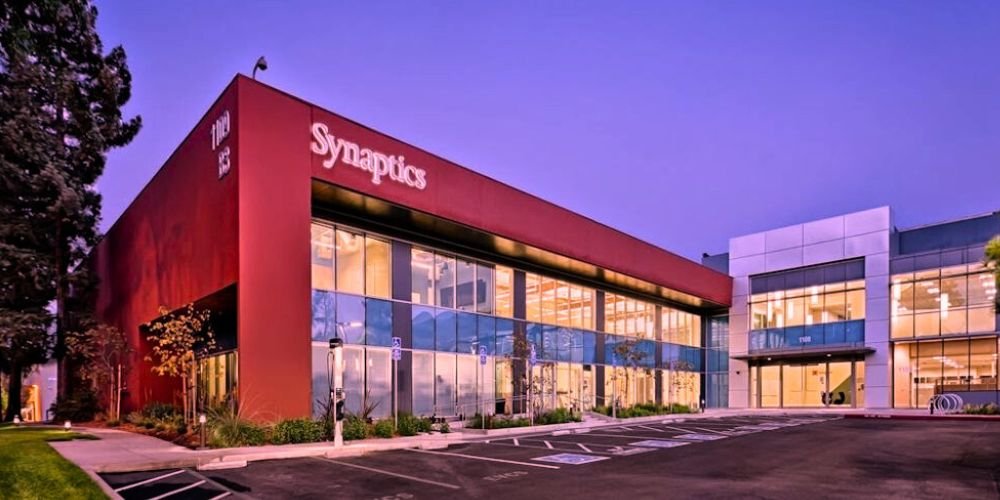Synaptics Incorporated, founded in 1986, is a pioneering force in human interface solutions. The company’s innovative products and technologies have been instrumental in shaping how users interact with their devices, spanning many applications, including touchscreens, biometrics, IoT, and artificial intelligence.
With a commitment to advancing human-machine interaction, Synaptics remains at the forefront of the tech industry, driving the evolution of user interfaces across both consumer and enterprise markets.
History and Evolution
Federico Faggin and Carver Mead, both renowned figures in the semiconductor and computing fields, co-founded Synaptics. The company’s early focus was on developing touchpad technology, quickly gaining traction in the laptop market. The introduction of the first touchpad in an IBM ThinkPad in 1994 marked a significant milestone, setting the stage for Synaptics’ future successes.
Over the years, Synaptics expanded its product portfolio to include various human interface solutions. The company’s strategic acquisitions, such as the 2013 purchase of Validity Sensors, enabled it to enter the biometrics market, providing fingerprint sensors for mobile devices and laptops. This diversification has allowed Synaptics to remain relevant and competitive in a rapidly changing technological landscape.
Core Technologies and Products
The innovative solutions leverage cutting-edge technology to meet the diverse needs of our clients.
Touch Solutions
Synaptics’ touch solutions have been a cornerstone of its product lineup. The company offers advanced touch controllers and display driver ICs (DDICs) for smartphones, tablets, and laptops. These technologies ensure smooth and responsive touch interactions, enhancing user experience. The company’s ClearPad® family of touch controllers is widely recognized for its high performance and reliability.
Biometrics
With the acquisition of Validity Sensors, it ventured into biometric authentication. The company’s fingerprint sensors are known for their accuracy and security, providing a seamless and secure user experience. Synaptics’ Natural ID fingerprint sensors are utilized in a wide range of applications, including mobile devices and access control systems.
Voice and Audio Processing
Synaptics has also made significant strides in voice and audio processing. The company’s AudioSmart® technology delivers high-quality voice and audio solutions for smart speakers, headphones, and other IoT devices. This technology is designed to provide clear voice recognition and superior sound quality, enhancing the overall user experience.
Display Technology
Synaptics’ display technology includes advanced DDICs and touch-and-display integration solutions. These products are designed to deliver vibrant visuals and responsive touch interactions, catering to the needs of modern consumer electronics. The company’s display solutions are utilized in a wide range of devices, including smartphones and automotive displays.
AI and IoT
Synaptics has embraced the growing trend of artificial intelligence (AI) and the Internet of Things (IoT). The company’s edge AI solutions enable smart devices to process data locally, reducing latency and enhancing privacy. Its’ Katana™ edge AI platform is designed for low-power AI applications, making it ideal for many IoT devices.
Market Impact and Presence
Synaptics’ technologies are integrated into millions of devices worldwide, making it a key player in the global tech industry. The company’s solutions are utilized by major OEMs (Original Equipment Manufacturers), including Apple, Samsung, Dell, and Lenovo, underscoring their importance in the supply chain of leading consumer electronics brands.
Its commitment to innovation further bolsters the company’s strong market presence. It invests heavily in research and development, ensuring it stays ahead of the curve in an ever-evolving industry. This focus on innovation has resulted in numerous patents and industry accolades, cementing Synaptics’ reputation as a leader in human interface technology.
Challenges and Future Outlook
Despite its successes, it faces several challenges. The rapidly changing tech landscape requires continuous innovation and adaptation. Competition from other tech giants and emerging startups poses a constant threat, necessitating ongoing investment in research and development (R&D) and strategic partnerships to maintain a competitive edge.
Looking ahead, Synaptics is well-positioned to capitalize on several emerging trends. The growing demand for AI-driven solutions, the proliferation of IoT devices, and the increasing importance of biometric security present significant opportunities for the company. By leveraging its expertise in human interface technology, it can continue to drive innovation and deliver cutting-edge solutions that meet the evolving needs of consumers and businesses.
Conclusion
Synaptics Incorporated has come a long way since its inception, evolving from a pioneer in touchpad innovation to a comprehensive provider of human interface solutions. The company remains at the forefront of the tech industry, boasting a robust portfolio of technologies and a steadfast commitment to innovation.
As it navigates the challenges and opportunities of the future, Synaptics’ focus on enhancing human-machine interaction will continue to shape how we interact with our devices, driving the next wave of technological advancements.





